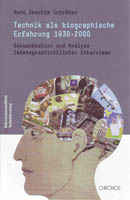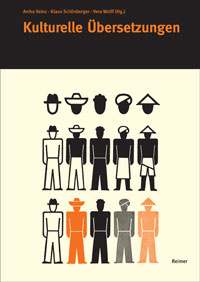CfP: SSTNET on "Science and Change".
Raymund Werle informiert uns über einen
Call for Papers des Research Networks "Sociology of Science and Technology" (SSTNET) der European Sociological Association (ESA).
Der Workshop "Science and Change" findet in Manchester, United Kingdom, am 6. und 7. April 2006 statt.
Research Networks der ESA sind vergleichbar mit den Sektionen der Deutschen Gesellschaft für Soziologie - also keine eng geknüpften Netzwerke.
Mehr Informationen zum SSTNET finden sich im Netz unter http://sstnet.iscte.pt/ (Der CfP ist noch nicht aufgenommen).
Call for Papers for a SSTNET (Sociology of Science and Technology Network) Workshop to be held in Manchester, the United Kingdom, on the 6th and the 7th of April, 2006
There is sufficient empirical evidence to claim that during the last two decades or so science, its practices and institutions have undergone radical, rapid and profound change – ‘new’ sciences have emerged, the relationship between ‘government’ and science has been transformed (Henkel, 1999; Simpson, 2004), different mechanisms for evaluating research and research performance have been developed (Bence & Oppenheim, 2004; McNay, 2003), research institutes have been privatised (Boden, Cox, Nedeva & Barker, 2004), the universities have developed a ‘third mission’ (Jacob at al., 2003), industry has been outsourcing research etc. This change has resulted more from exogenous imperatives rather than endogenous developments and has frequently met with resistance and challenge (see Boden at al, 2004).
While, fragmented accounts describing the transformations that have occurred exist there have been very few (if any) attempts to understand the sources, the nature and mechanisms of the latest change that science has been/is undergoing. Some of the concepts currently dominating the area of science and technology studies, most notably the ‘Mode1-Mode2’ concept (Gibbons at al., 1994) and the ‘Triple Helix’ concept (Leydesdorf & Etzkowitz, 1996) have attempted to interpret the dynamics of science. At closer examination, however, the former argues the existence of a ‘new’ mode of knowledge production but fails to explain the process of change (Shinn, 2002; Boden at al. 2004) and the latter failed to fulfil its methodological promises due to its broad nature and excessively complex language (Shinn, 2002). Hence, the issues around the latest changes affecting science, their source, drivers and mechanisms are still under-conceptualised and (quite possibly) under-studied. This is particularly surprising given the (potentially) serious consequences and irreversibility of the transformations of science.
It is both analytically valuable and practically important to distinguish between social change that that does not include clear intentionality and usually occurs as the aggregate effect of a large number of social actions (‘organic’ change) and social change that comprises intentionality and can be traced to/attributed to particular social actions/policy decisions (‘policy-driven’ change). These two types of change are also in complex interdependencies and in practice can and do usually converge. In other words, one can argue the dominance of one of these types of change but never its exclusivity (Boden at al., 2004). One possible feature of the latest change of science worth exploring is that the emphasis has shifted from predominantly ‘organic’ to predominantly ‘policy-driven’ change.
This Workshop will contribute to the understanding of the latest change of science in different contexts by encouraging more systematic comparative research and bringing together analyses of:
The types, direction and driving forces of change;
How does this change affect the different institutions involved in it (primarily research intermediaries and publicly funded research performers);
How does this change affect the knowledge structure and the practices of science?
More specifically we encourage contributions on the following issues:
The Workshop Organising Committee invites abstracts (up to 400 words) on any of the issues raised above. Abstracts should be sent via e-mail to Maria Nedeva (Maria.Nedeva [at] mbs.ac.uk), Luisa Oliveira (luisa.oliveira [at] iscte.pt), Sven Hemlin (sven.hemlin [at] sahlgrenska.gu.se) and Franc Mali (Franc.Mali [at] fdv.uni-lj.si) by the 31st January 2006. Decisions on these will be communicated to authors by the 14th of February.
If your abstract is accepted, you will be expected to submit a full paper no later than 25th March 2006.
Call for Papers des Research Networks "Sociology of Science and Technology" (SSTNET) der European Sociological Association (ESA).
Der Workshop "Science and Change" findet in Manchester, United Kingdom, am 6. und 7. April 2006 statt.
Research Networks der ESA sind vergleichbar mit den Sektionen der Deutschen Gesellschaft für Soziologie - also keine eng geknüpften Netzwerke.
Mehr Informationen zum SSTNET finden sich im Netz unter http://sstnet.iscte.pt/ (Der CfP ist noch nicht aufgenommen).
Call for Papers for a SSTNET (Sociology of Science and Technology Network) Workshop to be held in Manchester, the United Kingdom, on the 6th and the 7th of April, 2006
There is sufficient empirical evidence to claim that during the last two decades or so science, its practices and institutions have undergone radical, rapid and profound change – ‘new’ sciences have emerged, the relationship between ‘government’ and science has been transformed (Henkel, 1999; Simpson, 2004), different mechanisms for evaluating research and research performance have been developed (Bence & Oppenheim, 2004; McNay, 2003), research institutes have been privatised (Boden, Cox, Nedeva & Barker, 2004), the universities have developed a ‘third mission’ (Jacob at al., 2003), industry has been outsourcing research etc. This change has resulted more from exogenous imperatives rather than endogenous developments and has frequently met with resistance and challenge (see Boden at al, 2004).
While, fragmented accounts describing the transformations that have occurred exist there have been very few (if any) attempts to understand the sources, the nature and mechanisms of the latest change that science has been/is undergoing. Some of the concepts currently dominating the area of science and technology studies, most notably the ‘Mode1-Mode2’ concept (Gibbons at al., 1994) and the ‘Triple Helix’ concept (Leydesdorf & Etzkowitz, 1996) have attempted to interpret the dynamics of science. At closer examination, however, the former argues the existence of a ‘new’ mode of knowledge production but fails to explain the process of change (Shinn, 2002; Boden at al. 2004) and the latter failed to fulfil its methodological promises due to its broad nature and excessively complex language (Shinn, 2002). Hence, the issues around the latest changes affecting science, their source, drivers and mechanisms are still under-conceptualised and (quite possibly) under-studied. This is particularly surprising given the (potentially) serious consequences and irreversibility of the transformations of science.
It is both analytically valuable and practically important to distinguish between social change that that does not include clear intentionality and usually occurs as the aggregate effect of a large number of social actions (‘organic’ change) and social change that comprises intentionality and can be traced to/attributed to particular social actions/policy decisions (‘policy-driven’ change). These two types of change are also in complex interdependencies and in practice can and do usually converge. In other words, one can argue the dominance of one of these types of change but never its exclusivity (Boden at al., 2004). One possible feature of the latest change of science worth exploring is that the emphasis has shifted from predominantly ‘organic’ to predominantly ‘policy-driven’ change.
This Workshop will contribute to the understanding of the latest change of science in different contexts by encouraging more systematic comparative research and bringing together analyses of:
The types, direction and driving forces of change;
How does this change affect the different institutions involved in it (primarily research intermediaries and publicly funded research performers);
How does this change affect the knowledge structure and the practices of science?
More specifically we encourage contributions on the following issues:
- - Discussions and analyses of the interdependency between organic and policy driven change based on particular science or institution;
- - Can we argue that there has been a shift from organic to policy-driven change?
- - Accounts of change of the institutions of science: universities, research institutes, government labs, industrial research;
- - Researchers’ strategies to cope with and affect institutional change;
- - Change of the functions and structural positions of research intermediaries (Research Councils and equivalent) the effect on publicly funded research performers;
- - Interdependency between change of institutional structures and knowledge structures;
- - Change of the relationship between ‘government’ and science; factors and effects;
- - Evaluation practices and the change of institutions and knowledge;
- Ideological beliefs and the change of science;
The Workshop Organising Committee invites abstracts (up to 400 words) on any of the issues raised above. Abstracts should be sent via e-mail to Maria Nedeva (Maria.Nedeva [at] mbs.ac.uk), Luisa Oliveira (luisa.oliveira [at] iscte.pt), Sven Hemlin (sven.hemlin [at] sahlgrenska.gu.se) and Franc Mali (Franc.Mali [at] fdv.uni-lj.si) by the 31st January 2006. Decisions on these will be communicated to authors by the 14th of February.
If your abstract is accepted, you will be expected to submit a full paper no later than 25th March 2006.
kschoenberger - 1. Dez, 23:45
















Trackback URL:
https://technikforschung.twoday.net/stories/1219891/modTrackback